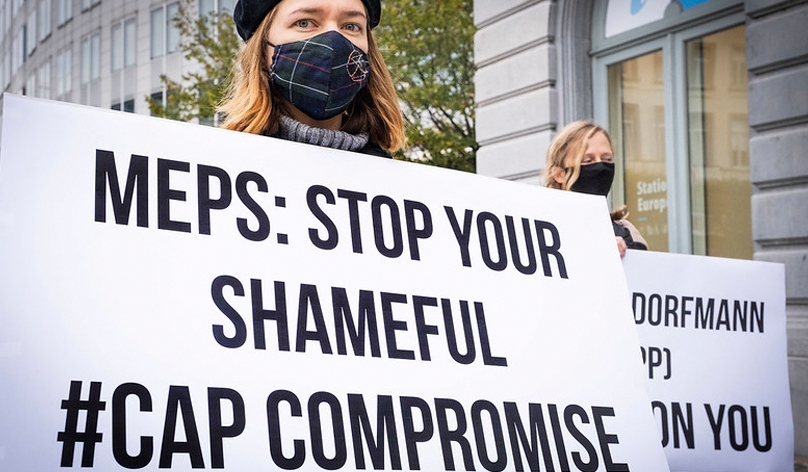Campaign Highlights Food, farming and nature
No to new GMOs

Our campaign to make sure a new wave of GMOs must undergo safety checks before they can be grown in the EU – and labeled as such if they are approved – was dealt a blow when the European Commission failed to follow a key European Court of Justice ruling. The court’s decision mandates that crops grown using new genetic modification techniques (such as gene drive techniques like CRISPR-Cas9) must undergo safety checks. But instead of implementing this, the Commission backed their development and expansion in its new the Farm to Fork Strategy. Throughout the year we alerted groups all over Europe about these worrying new developments, coordinated joint civil society statements at key moments, and built-up the movement for a GMO-free Europe. We continue to campaign for the ECJ’s ruling to be abided by.
Bring Nature Back

We called for extensive plans to save nature, both at the global and the European level.
We welcomed UN commitments to increase ambition for biodiversity protection, and the EU’s new 10-year-plan to tackle nature loss – but with caution. All targets for halting nature loss so far have been missed.
Internationally, we advocated for 30% Earth’s surface needs to be conserved. And at the European level, our nature campaign was closely linked to our work on agriculture. We called for real reform of the Common Agriculture Policy, including for 10% of agricultual areas to be prioritized for biodiversity.
At the same time we kept-up public awareness on the ecological crisis, including with a ‘Bring Nature Back’ viral video.
This is a welcome first step, but its good words and positive intentions need to be taken up by the rest of the Commission… to make sure nature is preserved.
in The Parliament Magazine
Growing Together
young friends of the earth Europe

Young Friends of the Earth Europe continued to strengthen its network of volunteer environmental justice activists, with hundreds of young people joining our online events.
Young Friends of the Earth Europe brought together over 3,300 young people through seminars, workshops, debate and actions to discuss how to build a just food system for the future, based on the principles of food sovereignty.
Together with our national member groups in five countries, we reached out to young people in rural areas and connected them with youth in towns and cities. Many of these participants were trained-up to engage in active debate, advocate to decision-makers, and practice their communications skills.
They also helped produce a Youth Declaration on Food Sovereignty, which was published in collaboration with young activists from La Via Campesina and ASEED.
These activities were part of the Growing Together project which came to an end in 2020 on a high note. In total, the project reached 130,000 people including urban and rural youth. The European-level trainings reached 170 youth from 6 countries who developed specific skills and in-depth knowledge required for effective organising with rural youth on issues of food sovereignty.
We created tools and resources on food sovereignty.


Mapping the decline of insects

Our Insect Atlas told the story of how the collapse in insect populations is driven by industrial farming. And it made headlines around the world.
The report showed how one third of insect populations worldwide are threatened with extinction. This is tied to the boom in pesticide use since the 1950s, and the explosion of soy monocultures required to feed factory farms.
Released with Heinrich-Böll-Stiftung, it made the news in over 300 different outlets in 30 countries, and helped set the agenda for the #SaveBeesAndFarmers campaign to get the EU to phase-out pesticides by 2035.
The evidence is clear: pesticide use is wiping out insect populations and ecosystems around the world, and threatening food production.
in Associated Press



